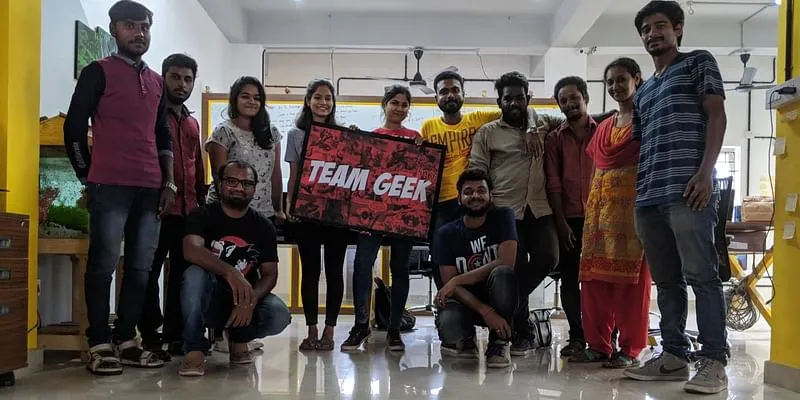These women entrepreneurs used Facebook to pivot, ensure engagement amid COVID-19
Rhea Punjabi of ADA Design Chikan Studio, Laksheeta Govil of FizzyGoblet, and Priya V of Skadoosh tell HerStory how they used Facebook and Instagram to understand the changing need of customers in the time of COVID-19.
The COVID-19-led lockdowns brought production, manufacturing, buying, and selling to a grinding halt.
In these unprecedented times, small businesses need to pivot to persist. With the internet being sometimes the sole and most effective medium for communication, businesses are using the power of social media to come up with innovative solutions, to pivot – and survive.

Laksheeta Govil, Rhea Punjabi, and Priya V
The Future of Business Report, a collaboration between Facebook, the World Bank, and the Organisation for Economic Co-operation and Development (OECD) to survey millions of small businesses on Facebook around the world, found 18 percent of people identifying as owners or managers of businesses on Facebook are women.
According to the report, women business owners on Facebook report the helpfulness of social media to their business at a rate that is statistically higher than their male counterparts.
During the lockdown, many women-led businesses continued to scale and engage on the platform – using it for customer acquisition, staying connected with existing customers, reaching new consumers, and interacting with like-minded businesses in the SMB ecosystem.
HerStory spoke to three women entrepreneurs, who are innovating to keep their businesses up and running during the pandemic, and how they have used Facebook and Instagram to understand the changing needs of customers.
First reactions
In India, when the first lockdown was announced on March 24, it hardly gave four hours to its people to come to terms with what would be “the new normal”. Entrepreneurs spoke of varied reactions ranging from surprise to shock, and finally acceptance.
Laksheeta Govil, Founder of FizzyGoblet, a handcrafted footwear label, says the startup’s first reaction and focus was on employee safety.
“We immediately shifted to work from home, and the main focus was to support all employees on health and finances. The business, of course would take a hit, but we were mentally and financially prepared for that, and so we pulled through the lockdown. Subsequently, we focused on our ecommerce channel fizzygoblet.com, our social media platforms, and treated this work from home as the longer-term new normal.”
For Rhea Punjabi, Co-founder, ADA Design Chikan Studio, a Lucknow-based brand, the first reaction was how she would manage and maintain the supply chain for the business, and handle communication with suppliers and customers in the wake of poor footfalls in retail spaces.
Priya V, Co-founder of Skadoosh, a specialised marketing agency in the training and education industry that focuses specifically on organising seminars and webinars, went by the scout’s motto, “Be prepared”.
“We had researched early on business models that could survive similar scenarios. I was a bit anxious about how the business landscape would evolve but I was also confident,” she says.
Impacting operations

Team Skadoosh
With a complete half of supply chain systems, ecommerce, manufacturing facilities, and shutdown of retail spaces, these businesses were impacted in different ways.
“The pandemic has impacted our operations gravely as multiple steps in the process have not been operational. Logistics and transportation have suffered immensely, making it very difficult to send out or receive anything swiftly. There have been many containment zones within city limits as well due to which mobility of supplies has also been impacted drastically. The average walk-ins at our brick-and-mortar stores have also declined sharply as people prefer to remain at home,” Rhea says.
For Fizzy Goblet, the initial hit was on its offline retail operations: its two stores in Delhi’s Promenade Mall and the other in Mumbai’s Palladium Mall.
“Fortunately, over the last several years we had built and constantly improved our online channel, and this helped seamlessly shift the operational focus to that. Even on ecommerce, the initial six weeks of the lockdown prohibited non-essential deliveries, and so we stayed in constant touch with our supportive customers to keep them posted on delivery schedules as things opened up. After fulfilling an initial backlog of deliveries in early May, our ecommerce channel has improved significantly, and is now tracking well ahead of pre-COVID sales. On the retail front, our Delhi store has re-opened with all the precautions and is seeing a gradual pickup in footfall and sales,” Laksheeta says.
As Skadooosh specialises in advertising for the training and personal development industry, Priya says all major projects, including lead generation and direct selling for seminars on various business and personal growth topics across India, came to a standstill.
Harnessing the power of social media
ADA Design Chikan Studio swiftly moved its focus from retail spaces. While the brand has always used Facebook and Instagram to reach out to large audiences, they kept going with updates on new collections and information on safety precautions in the wake of the pandemic.
Rhea explains, “As a small business, we rely heavily on prominent social media platforms such as Facebook and Instagram. We’ve used Facebook Messenger to help our customer support representatives to connect with existing and potential customers and resolve queries with a personalised touch. We've also used IGTV for showcasing fresh collections to our customers who wish to shop from home without having to step out. We’ve used the Facebook Ad Manager to custom-choose our audiences and target them with the category of products they are most likely to purchase. It has also helped in reaching our previous customers with new collections to encourage brand recall. The Catalog Manager has enabled us to showcase our best-sellers easily to a larger audience to increase the chances of clicks onto our website.”
At Fizzy Goblet, since Facebook and Instagram were channels integral to its business, with around 345K followers on Instagram alone, it wanted to keep the content fresh.
“We focused on engaging activities that we and our followers could do staying at home during the lockdown. One of the concepts was our Sunday DIY day and the Fizzy Kitchen with stories and instructions people could follow to make arts and crafts of the design and culinary variety. We also did an Easter Egg Hunt, where our followers had to hunt for Easter egg clues hidden on our website and Instagram page with prizes for winners who could complete the hunt. We organised Live sessions with our collaborators - Payal Singhal, Tribe Amrapali, and Rahul Mishra amongst others to share their wisdom and stories with our followers. The idea was to focus on positive, engaging, and fun activities so people get a change from the stories around the virus,” Laksheeta says.
Vocal for local
These woman entrepreneurs are all for following Prime Minister’s atmanirbharta and his call for being “vocal for local”.
Rhea explains: “Since ours is a hand-embroidered craft of regional importance, the government’s initiative has been in sync with our aim of promoting the art of Chikankari globally and mapping the craft. Vocal for Local has helped us in streamlining our efforts to push out more information, make consumers aware of the craft, and help them recognise the talent and hard work of women artisans from my city.”
Fizzy Goblet prides itself as a complete Made-in-India brand.
“Our artisans have been with us for six years, and we have now employed hundreds of artisans under them as well. Each pair takes more than 60 hours to make and involves skills that can take a lifetime to master. We appreciate the renewed push for Made-in-India products; it’s an idea whose time has come. For us, the idea goes beyond Made in India to taking India to the world. Currently, we offer free shipping internationally as well and offer the best quality designer footwear at affordable prices,” Laksheeta explains.
The Facebook advantage
Archana Vohra, Director – Small and Medium Businesses, Facebook India, shares insights on how the social media platform has been helping small businesses to build resilience and adopt new methods to run operations during the pandemic.
“One of the most significant ways in which we are enabling small businesses in India right now is by helping offline businesses pivot to digital seamlessly. COVID-19 has compelled many businesses to adopt digital and move from offline to online. For instance, Ada Designer Chikan Studio from Lucknow has been using IGTV to show their new collection and has also been using conversational marketing through Facebook Messenger to resolve customer queries,” she says.
Archana adds that a little financial support goes a long way and that’s why “we have created a $100 million grant programme to help 30,000 small businesses across 30 countries, including India”.
“Looking at the pandemic, we built on our digital skilling initiatives for the timely skilling and mentoring of small businesses to ensure they can focus on recovery and efficiency. Boost with Facebook, the flagship programme for skilling businesses, went virtual, reaching out to more than 12,000 small businesses. The FB Advertiser Vintage programme, which aims to skill young businesses, pivoted to webinars offering custom solutioning, customer acquisition, and test-and-learn assistance. It will skill more than 3000 businesses this year,” Archana says.
As part of the VC Brand Incubator initiative, Facebook continued to engage with young brands. It started Campaign Lab, which has helped direct-to-consumer brands get “creative solutioning support and go live with mobile-friendly creatives and strategies in under 72 hours”.
To support small businesses in the food industry, Instagram recently rolled out the food order sticker in India. Businesses can now share Instagram’s new food order sticker on their Stories, and people can tap to place their order through the and website. Instagram also recently introduced the Support Small Business sticker to give people an easy way to show their love for small businesses.
(Edited by Teja Lele Desai)








